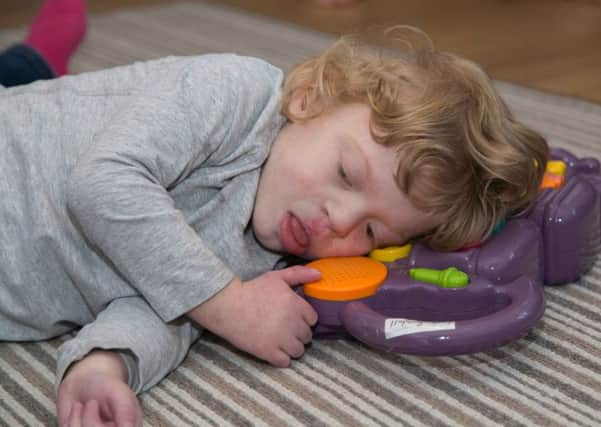Little Luke helps to highlight the plight of disabled children


Simon and Liz Randall and their son Luke, five, have been working with national deafblind charity Sense - and with former education secretary Lord David Blunkett - to launch a report into the problem.
Little Luke suffers from epilepsy, has poor vision and limited hearing. Now his mum Liz has highlighted negative attitudes towards Luke’s condition which have hampered him in gaining a place at a mainstream nursery or playgroup. The family were consulted as part of a three month inquiry into the provision of play opportunities for disabled children aged 0-5 with multiple needs in England and Wales.
Advertisement
Hide AdAdvertisement
Hide AdTheir feedback is included in the ‘Play report’, which was launched in Parliament on Wednesday. It reveals that across the country, eight out of 10 parents have struggled to access a mainstream play setting and, shockingly, one in two disabled children have been turned away from play activities.
Sense estimates that there are currently 1,100 disabled children in the West Sussex area; however nine out of ten parents of children with disabilities feel that their child does not have the same opportunities to play as their non-disabled peers.
This means that more than 1,000 disabled children in West Sussex may be facing barriers to the play opportunities that are vital to their emotional, social and physical development.
The report is also calling for local authorities, including West Sussex County Council, to consider retraining of health professionals to enable them to support play for children with multiple needs, provide easily-accessible information on existing play and support services and to help increase awareness of disabled children in the local community.
Advertisement
Hide AdAdvertisement
Hide AdLocal play settings are encouraged to train staff on disability to help them create an environment and ethos which is inclusive and developmentally appropriate and to plan the admissions of every child to ensure their needs are met and that they will be welcomed and understood by other parents and their children.
Liz Randall said: “There is a lack of information on what support is available and where to find accessible play opportunities. The playgroups and nurseries we found weren’t equipped for a child with complex needs. The environment was often hazardous, whether that was the layout of the area, the furniture or unsuitable toys.
“Luke needs lots of sensory stimulation, he responds really well to toys with bells, whistles, different textures and lights and sounds, but it’s rare that these are provided.
“We also need somewhere soft, like a ball pool or trampoline, however many facilities seem to have hard surfaces which are not great for Luke who likes to lie on the floor a lot and test things with his head.
Advertisement
Hide AdAdvertisement
Hide Ad“We’re often confronted by quite ignorant views and attitudes. Other children tend to be inquisitive about Luke, but many parents are reluctant to include us.
“You can see them steering their child away, it’s like they think his condition is contagious. For this reason, it is tempting to stick to specialist settings and just spend time with people who see Luke, for Luke.”
Lord Blunkett and Sense are now calling for urgent action to address the failings at every level which are estimated to affect over half a million disabled children nationally, and for the Prime Minister to deliver on his recent call to improve the ‘life chances’ of all children.
A lack of attention by government, insufficient funding at a local level and negative attitudes towards disabled children and their families are all barriers highlighted in the report.
Advertisement
Hide AdAdvertisement
Hide AdPlay Inquiry chairman Lord Blunkett, said: “We know that play is vitally important for children with multiple needs and their families, bringing a wide range of developmental and emotional benefits.
“However, our inquiry found that all too often the parents of children with multiple-needs point to barriers they face in accessing and enjoying play.
“It means that disabled children don’t have the same chance to form friendships, and parents are prevented from taking a break from caring.
“Both disabled children and their parents are excluded from their own communities.
Advertisement
Hide AdAdvertisement
Hide Ad“I know that there is strong support across the political spectrum for addressing the findings of this report, and I look forward to working with colleagues from all parties to achieve real change for parents and families across the nation.”
Sense deputy CEO, Richard Kramer, said: “Play is critical in giving children the best start in life and improving outcomes for children and their families.
“The report makes clear, however, that where a child has multiple needs, the barriers they face to accessing play settings and activities are also multiplied.
“We hope that local and national policymakers, as well as play professionals, reflect on today’s recommendations, and make the necessary changes that will make access to play a reality for all children.”
Advertisement
Hide AdAdvertisement
Hide AdSense will use the inquiry findings to campaign for changes to the way play services are designed and delivered. They plan to produce a series of toolkits for parents, providers and commissioners of play.
The full report can be downloaded at: www.sense.org.uk/play